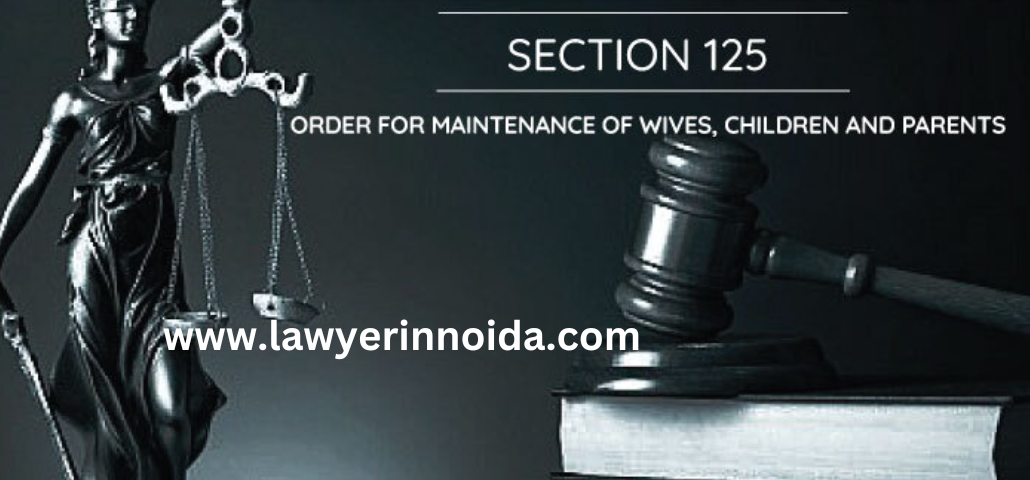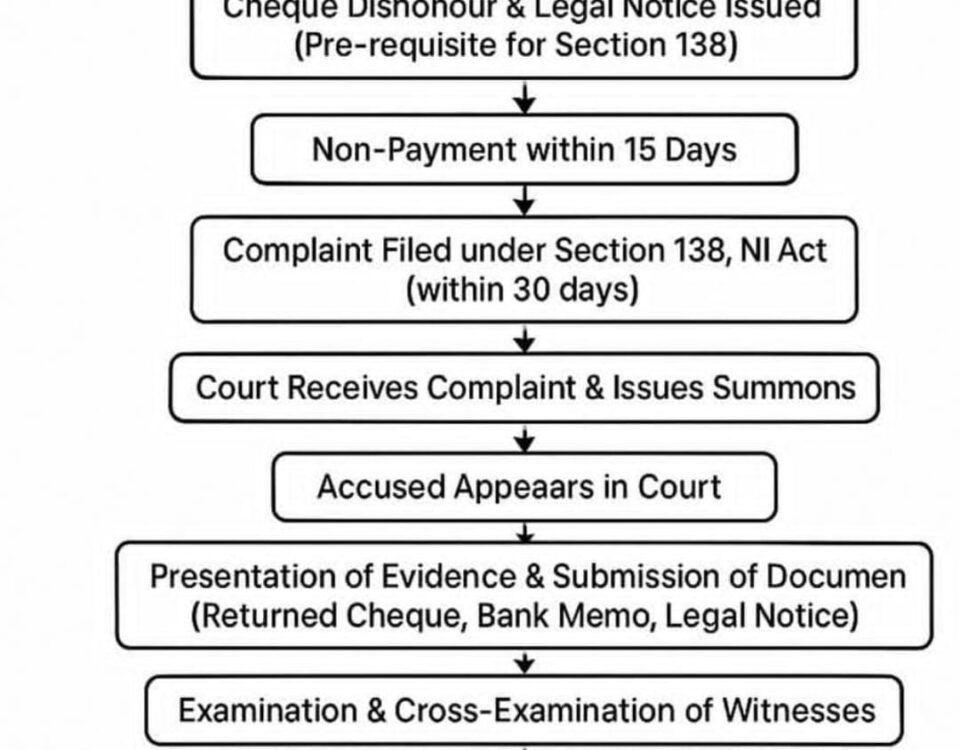- Top-rated Best Lawyer in Noida
- +91 96161-66166
- [email protected]

Divorce Lawyer in Noida – Expert Legal Assistance
February 5, 2025
Do you know about Article 32 of the Constitution
May 7, 2025Section 125 of the CrPC: Maintenance Laws in India
What is Section 125 of the CrPC?
Section 125 of the Criminal Procedure Code, 1973, was enacted to provide a quick and effective remedy for individuals who are unable to support themselves. The provision serves as a safety net, allowing individuals who are financially dependent on others to seek maintenance when they are no longer able to sustain themselves due to neglect or abandonment. This section is especially vital in cases where a wife is deserted by her husband, children are neglected by their parents, or elderly parents are abandoned by their children. It is a civil remedy that focuses on providing immediate relief to individuals in need, without requiring a lengthy legal battle, which might further delay financial support. Section 125 aims to ensure that no one is left destitute if they are unable to support themselves. It is an important tool for securing basic financial security and protecting the rights of the most vulnerable members of society. By holding individuals accountable for the maintenance of their family members, the law enforces a moral duty that transcends mere legal obligation. It promotes a sense of familial responsibility, ensuring that those who have the means to support others do not neglect their duty.
Eligibility for Maintenance Under Section 125 CrPC:
One of the primary aspects of Section 125 CrPC is its wide coverage, allowing different categories of individuals to claim maintenance. The law is designed to protect the financially dependent members of a family by ensuring that they receive proper support from those who are responsible for their well-being. The following categories are eligible for maintenance under this law:
- Wife: A wife has the legal right to claim maintenance under Section 125 if she is unable to maintain herself. This includes cases where the wife is legally separated from her husband, abandoned, or even in instances where the husband refuses to provide financial support. Even in cases of marital discord, if a wife finds herself in a situation of financial distress, she can seek legal recourse through this section. This provision is particularly significant in the context of divorce or separation, where one party is left without adequate means of support. It also applies to women who may be in abusive or strained marriages, allowing them a means to secure a better future.
- Children: Children, especially minors or those who are unable to maintain themselves due to illness, disability, or other factors, are entitled to claim maintenance from their parents. The law ensures that children receive proper care, attention, and sustenance even in cases where a parent may not be fulfilling their responsibilities. In cases of divorce or separation, this provision becomes crucial in ensuring that the child’s financial needs are adequately met by both parents. The law recognizes that a child's right to sustenance is paramount and that they should not be left vulnerable due to the neglect of a parent.
- Parents: Parents who are elderly or infirm and unable to support themselves can seek maintenance from their children. This provision ensures that aging parents are not neglected in their later years and that their children fulfill their familial duty to provide financial and emotional support. Many times, elderly parents find themselves abandoned or left without sufficient financial resources to care for themselves. Section 125 CrPC ensures that the elderly are not left to struggle alone and that their children's responsibilities towards them are upheld.
Key Features of Section 125 CrPC:
- Purpose: The primary aim of Section 125 CrPC is to provide immediate financial relief to individuals who are unable to maintain themselves. It is an accessible and efficient way for the courts to ensure that individuals receive their entitled support in cases of abandonment or neglect. The law is not meant to be a lengthy legal procedure but rather a mechanism to quickly address financial hardship. It plays a critical role in preventing people from falling into abject poverty due to the failure of family members to provide care.
- Right to Claim Maintenance: The right to maintenance under Section 125 is a fundamental right granted to individuals who are unable to support themselves. This right is not dependent on marital status, gender, or age. It applies equally to men, women, and children, making it a progressive and inclusive provision that upholds the dignity of all people, regardless of their gender or age.
- Speedy Process: One of the key advantages of Section 125 CrPC is that it provides a speedy process for seeking maintenance. The application for maintenance can be made directly to a magistrate, and the court can issue an order without requiring prolonged trials or legal proceedings. This is particularly important for individuals in urgent need of financial support. The law recognizes that in cases of neglect or abandonment, immediate action is often necessary to prevent the individual from suffering further harm.
- Income of the Respondent: The court will take into account the financial ability of the person from whom maintenance is being sought. Factors such as the respondent's income, assets, lifestyle, and overall financial situation are considered while deciding the amount of maintenance. This ensures that the maintenance amount is realistic and reflects both the needs of the petitioner and the ability of the respondent to pay.
Conditions for Seeking Maintenance:
- Inability to Maintain Oneself: For a person to seek maintenance under Section 125 CrPC, they must demonstrate that they are unable to maintain themselves. This can include situations where the person is unemployed, ill, or physically unable to work. Proof of financial need must be provided, and the person must show that they are not capable of supporting themselves independently.
- Financial Capability of the Respondent: The person from whom maintenance is sought must have the financial ability to provide support. The court will consider factors such as income, assets, and overall wealth before deciding the amount. The law ensures that maintenance is only sought from individuals who have the means to provide it, thus preventing undue burden on someone who may themselves be struggling financially.
- Non-remarriage Clause for Women: A wife is generally entitled to maintenance until she remarries. However, if a woman is unable to support herself due to sickness or other factors, she may continue to receive maintenance even after remarriage. This provision protects women who may be in a vulnerable position and unable to support themselves even after remarriage.
How to File for Maintenance Under Section 125 CrPC:
Filing for maintenance under Section 125 CrPC involves a well-defined process. Here's a detailed breakdown:
- Filing the Petition: The individual seeking maintenance must approach the Magistrate Court or Family Court with a petition. The petition must include information about the reasons for seeking maintenance and evidence of the individual's inability to support themselves. Supporting documents such as proof of income, medical certificates (if applicable), and other relevant documentation should be submitted to strengthen the case.
- Court Proceedings: Once the petition is filed, the court will issue a notice to the respondent, who will be given a chance to respond. Both parties will be required to present their case, and the court will weigh the evidence provided. During these proceedings, the court will assess the financial situation of both parties and decide whether the petitioner is entitled to maintenance.
- Determining the Amount of Maintenance: The amount of maintenance will be decided based on the respondent's financial capacity, the needs of the petitioner, and other relevant factors such as the number of dependents and lifestyle. The court aims to strike a balance between ensuring that the petitioner is supported adequately and not placing an undue financial burden on the respondent.
- Enforcement of Maintenance Orders: Once the court issues an order for maintenance, the respondent is obligated to comply with the court’s decision. If the respondent fails to pay the maintenance amount, enforcement actions may be taken. These actions can include garnishment of wages, seizure of assets, or even imprisonment if the respondent continues to evade the payment of maintenance.
Amount of Maintenance:
The amount of maintenance awarded under Section 125 CrPC varies depending on several factors. These include:
- Income of the Respondent: The court will consider the respondent’s income, assets, and financial obligations before determining the amount of maintenance. The amount awarded should reflect the respondent’s ability to support the petitioner without causing undue hardship.
- Living Standards: The petitioner’s existing living standards will also play a role in determining the amount. The court aims to ensure that the petitioner’s basic needs, such as food, shelter, clothing, and medical care, are met.
- Number of Dependents: If the respondent has multiple dependents, the amount of maintenance may be adjusted accordingly. The court will consider the respondent’s responsibility towards other dependents before finalizing the maintenance amount.
Have a question?
Ask the experts.
Marriage as an institution has undergone various changes and while it may turn out to be a life-long companionship for most, it simply is an excruciating ordeal for some. To accommodate the changing facets of the institution of marriage, the law has introduced amendments from time to time. Today, divorce is no longer a taboo and is rapidly being resorted to dissolve a marriage which no longer serves its purpose.
Write us a message
Get in touch
- LAWYER IN NOIDA
TS-1103, 11th Floor, Office Tower, Galaxy Blue Sapphire Plaza, Noida Extension, Greater Noida West, Uttar Pradesh-201308 (Near Gaur City Mall)
Conclusion:
Section 125 CrPC serves as a vital tool in ensuring that individuals who are unable to maintain themselves are not left destitute. By granting the right to maintenance, the law ensures that vulnerable individuals, especially women, children, and elderly parents, are supported by those who have the legal and moral responsibility to care for them. The process of seeking maintenance under this provision is straightforward, allowing individuals to quickly address their financial needs in times of crisis. If you or someone you know is in need of maintenance, consulting a legal expert can help ensure that your rights are protected and that the process is followed correctly.
Final Thoughts:
As a society, it is important that we recognize the need to protect our family members from neglect and abandonment. Section 125 CrPC is a testament to the legal system’s commitment to safeguarding the rights of those who are dependent on others for support. It emphasizes the responsibility that individuals have towards their loved ones, ensuring that no one is left behind when in need.
In every society, the family unit plays a pivotal role in providing support and security to its members. The well-being of individuals within a family is crucial, as it ensures their emotional, physical, and financial needs are met. However, not all relationships remain harmonious, and in some cases, individuals may face abandonment or neglect. This is where Section 125 of the Criminal Procedure Code (CrPC) comes into play, a legal remedy specifically designed to protect those who cannot support themselves. Primarily, this section ensures that women, children, and parents receive financial support from those legally obligated to provide it. Whether due to separation, divorce, or negligence, Section 125 CrPC plays a crucial role in safeguarding the dignity and financial stability of individuals in distress. This law guarantees that a person’s basic needs are met, preventing them from falling into a situation of destitution due to the unwillingness of family members to fulfill their responsibilities. In this blog, we will explore the key aspects of Section 125 CrPC, its provisions, and the procedure through which individuals can seek maintenance under this law. Understanding this provision is important for anyone who might be in a situation where financial support is necessary but denied.

